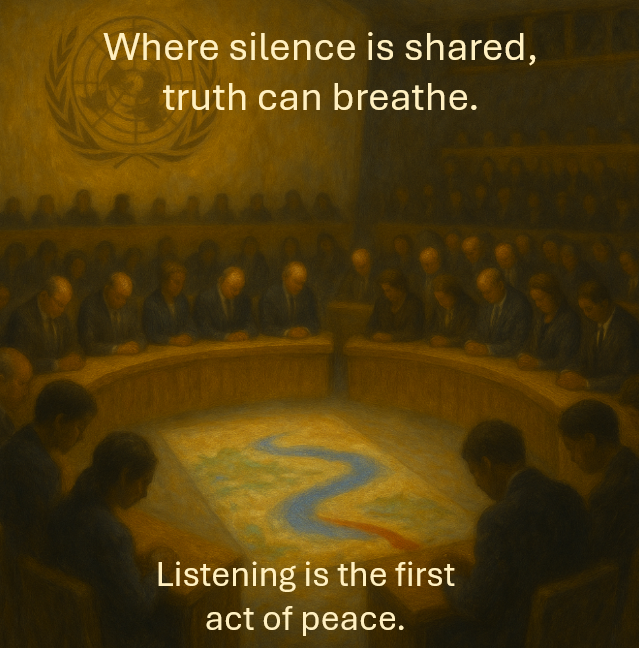
The wind along the East River moved with an early spring hush, carrying a chill that felt like memory rather than weather. Glass towers held the morning light in vertical rivers, and the United Nations rose among them — solemn, shimmering, expectant.
Emil stepped out of the shuttle with the ledger at his side. The others — Aisha, Mina, Priya, Jaden — followed quietly. No one spoke. There are thresholds in life where words feel premature, and this was one of them.
They passed through layers of security, translators, hurried aides, and screens blooming with flags. Hallways curved like corridors of history, lined with portraits of wars survived and peace imagined. The Circle walked through them not as experts, nor delegates, nor revolutionaries — but as witnesses.
They were led into a round chamber arranged in a circle of desks and nations. Placards etched with borders, watersheds, and former empires waited like silent arguments. At the center stood a small podium, a canvas panel on an easel, and a muted screen ready for projection.
A bell sounded. Delegates filed in — presidents, ministers, envoys, ambassadors. Some brows were stern. Others tired. A few curious. Many resigned.
A moderator approached the microphone.
“The floor now welcomes a youth delegation known as The Circle, to share their findings from the Kyiv peace initiative.”
A murmur went through the room. A youth delegation? From a mural? From a shelter? Some glanced at their tablets, already skeptical.
Emil stepped forward, but he did not stand at the podium. Instead, he stood in the open center — hands empty, voice low.
“There is a tradition in the places that have suffered most,” he said. “Before speaking, they honor silence — so the truth has room to enter.”
Then he closed his eyes.
The Circle did the same.
A minute passed.
Then another.
By the third, the chamber’s impatience softened into confusion — and then into stillness. The silence did not accuse. It did not demand. It simply was — wide enough for everyone to hear themselves in it.
Emil opened his eyes.
“In Kyiv,” he began, “we learned that peace does not start with answers, or treaties, or speeches. It begins when someone is given space to speak a pain no one has dared to hear. We are not here to persuade you. We are here to listen — to what is buried beneath your borders.”
The moderator blinked. Delegates straightened.
Aisha unrolled a fragment of the Kyiv mural — the section where the blue river crossed beneath Danylo’s crimson path. Mina dimmed the lights, and Priya cast data across the wall — not charts of GDP or casualty counts, but colors: empathy frequencies, emotional shifts, grief patterns thawing into hope.
Mina spoke softly:
“These are not numbers. They are confessions, transformed into constellations.”
Aisha added:
“Every color you see here came from a child who trusted a wall more than the world that built it.”
Then Emil continued with the line:
“Peace is not the erasure of difference, but the space that allows difference to breathe without becoming a battlefield. Its strength is not in what we construct, but in what we keep open — so that our differences become opportunities for justice, and for every good that can grow from it.”
Somewhere in the chamber, a diplomat exhaled — audibly. Another lowered his gaze.
Emil then held up a single folded slip from the Quiet Box.
“This is what a child wrote, not far from the front line:
‘If adults must draw borders, at least leave room for the river.’”
He let the words settle.
A silence followed — not awkward now, but reverent, and shared.
Emil stepped back. “We are not here to offer a model,” he said. “We are here to offer a posture: Listen first. Speak second. Build last. A world that reverses that order cannot heal.”
The delegates did not applaud. They did something rarer:
They remained silent — willingly this time.
The moderator finally rose, voice softer than before. “The Circle’s recommendations will be entered into the record,” she said. “We ask the delegates to carry this session forward with reflection, not reaction.”
The bell sounded again.
But no one moved at first.
And in that stillness — that unnamed agreement — something shifted. A chamber built for argument remembered, for a brief, clear moment, how to listen.
The session adjourned. The Circle stepped out into a corridor of murals from past peace missions. But this time, the walls did not feel like history. They felt like prelude.
Aisha whispered, “Do you think they understood?”
Emil closed the ledger. “Understanding comes later,” he said. “Today, we gave the world its silence back.”
They walked on, toward the next river.
Ledger Entry — Assembly of Rivers
Date: May 9, 2026
Symptom:
Global forum encounters silence as a method; emotional truth displaces diplomatic routine; skepticism gives way to reflection; space for shared conscience briefly achieved.
Disease — The Four Absences (Global Context):
- Absence 1 (Exclusion): Nations guard narratives as territory; borders protect identity by denying the other; listening is treated as concession.
- Absence 2 (Vengeance): Historical grievances weaponized; memory becomes justification, not reconciliation.
- Absence 3 (Dehumanization): Policies measure populations, not people; humans reduced to statistics, maps, and mandates.
- Absence 4 (Unheard Cry): The suffering of civilians — especially children — lost behind national rhetoric; their voices absent from decision tables.
Investigator’s Response:
Introduced silence as forum posture; presented mural fragment and emotional-constellation data; centered child testimonies over national claims; invited delegates to reflect before debate; reframed peace as shared listening.
Outcome:
Session softened; tone shifted from rhetoric to reverence; delegates temporarily unified by silence; empathy registered though no policy yet changed; symbolic door opened for continued engagement.
Note:
Diplomacy begins where certainty ends. Peace expands through the courage to listen before defending.

